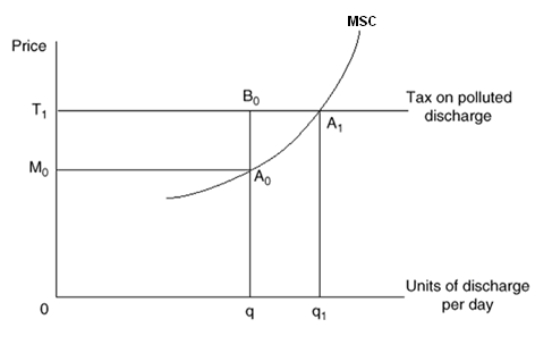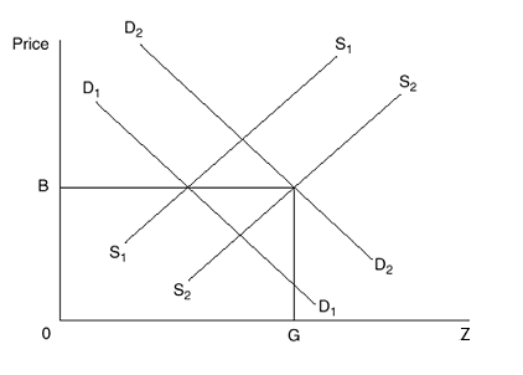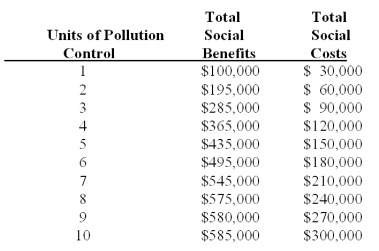Exam 4: Pollution Problems: Must We Foul Our Own Nests
Exam 1: Alleviating Human Misery: The Role of Economic Reasoning124 Questions
Exam 2: Economic Systems, Resource Allocation, and Social Well-Being: Lessons From Chinas Transition122 Questions
Exam 3: Government Control of Prices in Mixed Systems: Who Are the Winners and Losers123 Questions
Exam 4: Pollution Problems: Must We Foul Our Own Nests128 Questions
Exam 5: Economics of Crime and Its Prevention: How Much Is Too Much126 Questions
Exam 6: The Economics of Education: Crisis and Reform122 Questions
Exam 7: Poverty Problems and Discrimination: Why Are so Many Still so Poor121 Questions
Exam 8: The Economics of Monopoly Power: Can Markets Be Controlled129 Questions
Exam 9: The Economics of Professional Sports: What Is the Real Score120 Questions
Exam 10: Competition in the Global Market-Place: Should We Protect Ourselves From International Trade131 Questions
Exam 11: Economic Growth: Why Is the Economic Road so Bumpy138 Questions
Exam 12: Money,Banking and the Financial System: Old Problems With New Twists130 Questions
Exam 13: Unemployment and Inflation: Can We Find a Balance119 Questions
Exam 14: Government Spending,Taxation,and the National Debt: Who Wins and Who Loses125 Questions
Exam 15: Social Security and Medicare: How Secure Is Our Safety Net for the Elderly124 Questions
Select questions type
Polluting firms charge prices below what would exist without pollution.
(True/False)
4.9/5  (35)
(35)
The "marginal social benefit" of an economic activity is the benefit that is just above the margin of being zero.
(True/False)
4.9/5  (42)
(42)
If the MPC of production is less than the MSC,the market will produce too much of the product.
(True/False)
4.8/5  (28)
(28)
Enjoying the smell of bread baking from your neighbor's house is an example of a negative externality.
(True/False)
4.9/5  (41)
(41)
A pollution rights market can be an efficient method of pollution control.
(True/False)
4.9/5  (35)
(35)
When firms make decisions about output and about the amount of pollution that they produce,without government regulation
(Multiple Choice)
4.9/5  (46)
(46)
When a firm has to clean environmental resources prior to using them,the consumers of that firm's products are charged higher prices than would exist in the absence of pollution.
(True/False)
5.0/5  (43)
(43)
A major advantage of using taxes to control pollution is that they provide an incentive to the polluter to seek improved ways to clean up dischargE.
(True/False)
4.8/5  (30)
(30)
The socially optimal level of production for any good or service is found where MPB=MPC.
(True/False)
4.9/5  (41)
(41)
If your snoring keeps your roommate from sleeping,you roommate is experiencing a negative externality.
(True/False)
5.0/5  (41)
(41)
When a firm pollutes,its product will be under-priced and over-produceD.
(True/False)
4.8/5  (37)
(37)
The optimum level of pollution control is where marginal social benefit equals marginal social cost.
(True/False)
4.8/5  (37)
(37)
The Following Questions Refer to the graph below.  -A tax of more than T1 per unit on polluted discharge will induce the firm to clean up
-A tax of more than T1 per unit on polluted discharge will induce the firm to clean up
(Multiple Choice)
4.7/5  (36)
(36)
The Following Questions Refer to the graph below.  -Assume that the current market demand and supply curves for Z are D1 and S1 and there are positive social spillovers associated with the production of Z.Which curve could represent the MSC curve for Z?
-Assume that the current market demand and supply curves for Z are D1 and S1 and there are positive social spillovers associated with the production of Z.Which curve could represent the MSC curve for Z?
(Multiple Choice)
4.9/5  (41)
(41)
It is efficient for regulatory bodies to induce reduction in pollution when the marginal social cost is lowest,regardless of which firms are the worst polluters.
(True/False)
4.8/5  (31)
(31)
Following Questions are based on the following information.
In a small city located on a lake,the raw sewage of the city is dumped directly into the lakE.This has been a source of distress for citizens who like to swim,fish,and water ski.A study has been instituted to determine what value the citizens place on pollution control,and the results are listed in the following tablE.Costs of pollution control are also listed.
 -The marginal social benefit of the sixth unit of pollution control is
-The marginal social benefit of the sixth unit of pollution control is
(Multiple Choice)
4.9/5  (41)
(41)
To date,there has been no formal use of pollution rights markets.
(True/False)
4.8/5  (35)
(35)
Showing 101 - 120 of 128
Filters
- Essay(0)
- Multiple Choice(0)
- Short Answer(0)
- True False(0)
- Matching(0)